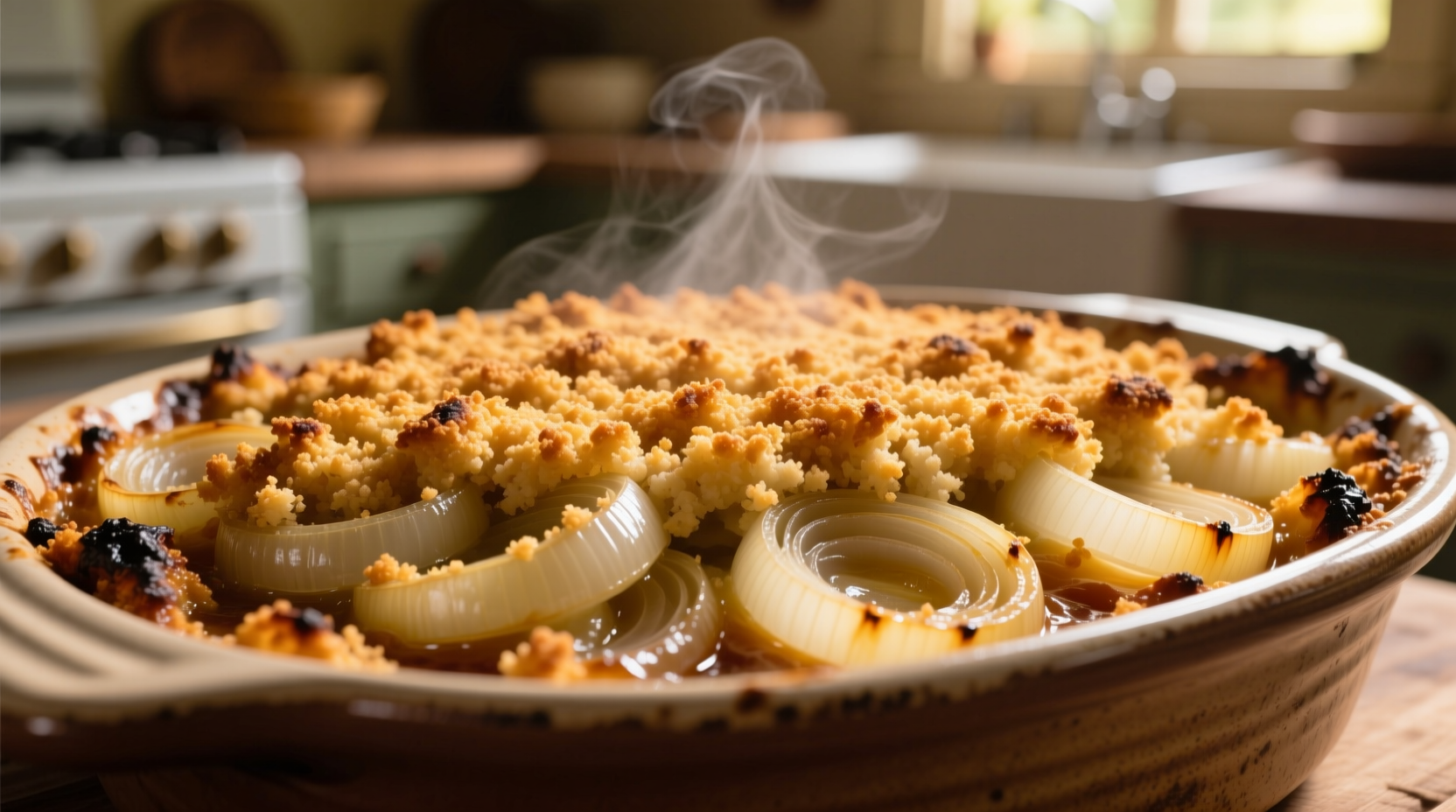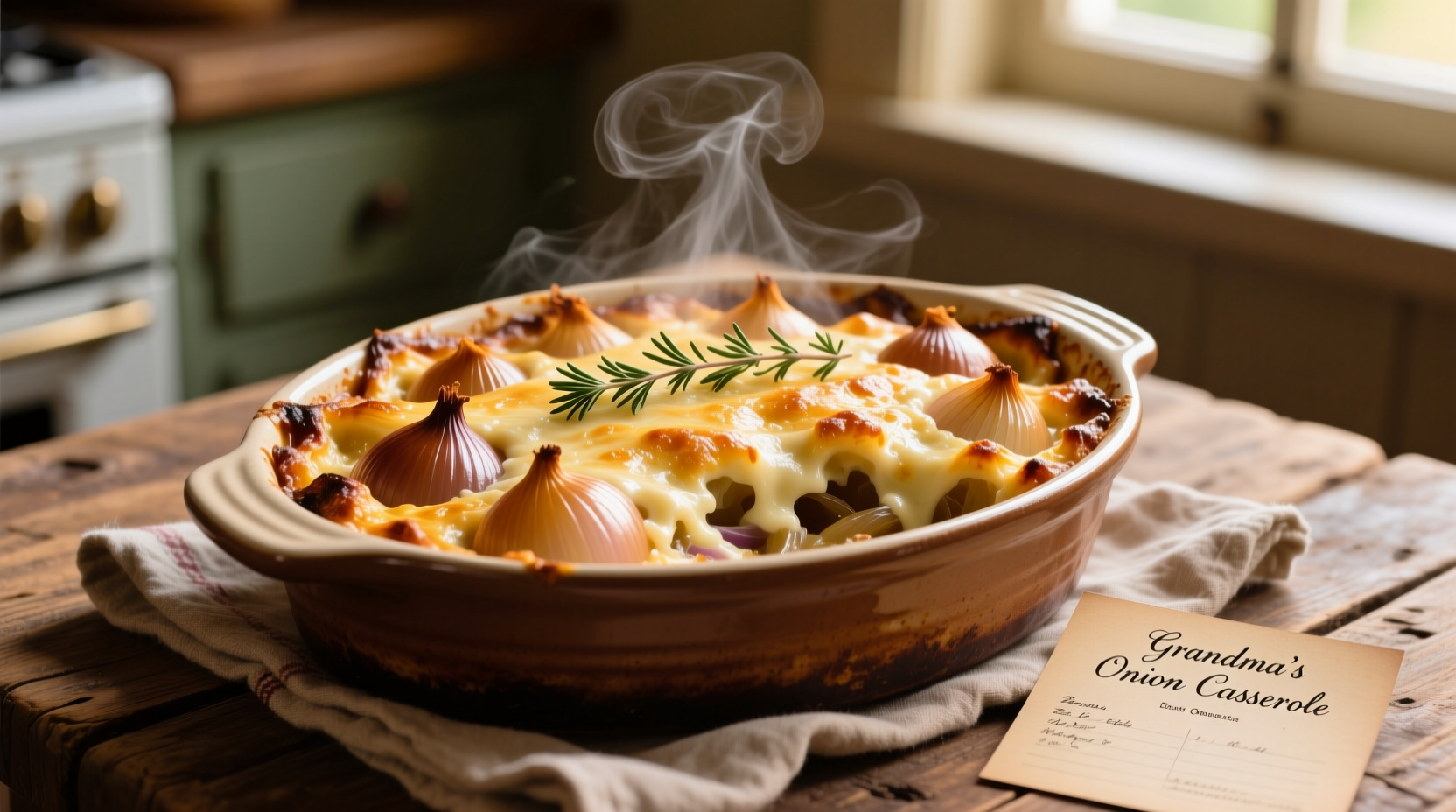Get the perfect onion casserole with this classic recipe featuring caramelized onions, creamy sauce, and crispy breadcrumb topping. Ready in 60 minutes with simple ingredients you likely have in your pantry.
There's something magical about transforming humble onions into a rich, comforting casserole that's become a staple at family gatherings for generations. This onion casserole recipe delivers the perfect balance of sweet caramelized onions, creamy sauce, and crunchy topping that makes it irresistible as both a holiday centerpiece and weeknight side dish.
The Evolution of Onion Casserole Through American Cooking History
Onion casseroles emerged during America's mid-20th century cooking evolution when home economists began experimenting with combining pantry staples into convenient baked dishes. The classic version using canned soup gained popularity in the 1950s as processed foods became mainstream, but today's home cooks have rediscovered how simple ingredients create superior flavor.
Onion Casserole Timeline: From Farmhouse to Fine Dining
- 1920s-1940s: Rural American households created "onion puddings" using butter, onions, and breadcrumbs baked in cast iron
- 1950s: Campbell's Soup Company popularized the canned soup version, making it accessible to millions
- 1970s-1990s: Became a Thanksgiving staple alongside green bean casserole
- 2000s: Food network chefs began elevating the dish with gourmet ingredients
- Today: Home cooks balance tradition with scratch-made sauces and artisanal toppings
Why This Onion Casserole Recipe Works Every Time
The secret to exceptional onion casserole lies in proper onion preparation and sauce consistency. Unlike recipes that simply dump ingredients together, this method ensures deep flavor development through controlled caramelization and balanced seasoning.
| Onion Variety | Caramelization Time | Flavor Profile | Best For |
|---|---|---|---|
| Yellow Onions | 25-30 minutes | Rich, sweet, complex | Classic casserole base |
| Sweet Onions (Vidalia) | 20-25 minutes | Mild, delicate sweetness | Beginner-friendly version |
| Red Onions | 30-35 minutes | Earthy with subtle sharpness | Gourmet variations |
| Shallots | 15-20 minutes | Delicate, nuanced flavor | Special occasion dishes |
Essential Equipment for Perfect Onion Casserole
You don't need specialty equipment, but these tools make the process smoother:
- 10-inch oven-safe skillet (cast iron works perfectly)
- Wooden spoon for stirring onions
- Microplane grater for fresh nutmeg
- Measuring cups with pour spouts
- 9x9 inch baking dish if not using oven-safe skillet
Step-by-Step Onion Casserole Preparation
Caramelizing the Onions Properly
Many home cooks rush this critical step, but proper caramelization transforms onions from sharp to sweet:
- Slice 3 large yellow onions (about 2 pounds) uniformly using a mandoline or sharp knife
- Melt 3 tablespoons butter in your skillet over medium-low heat
- Add onions and 1 teaspoon salt to draw out moisture
- Cook uncovered for 25-30 minutes, stirring every 5 minutes
- When onions reach deep golden brown color, add 1 tablespoon balsamic vinegar
- Cook 2 more minutes until vinegar evaporates
Creating the Perfect Sauce Base
While onions cook, prepare the sauce that binds everything together:
- Melt 3 tablespoons butter in separate saucepan
- Whisk in 3 tablespoons flour to create roux
- Cook 2 minutes until golden but not browned
- Gradually whisk in 1 ½ cups whole milk
- Add ½ teaspoon each of thyme, paprika, and freshly grated nutmeg
- Cook until thickened enough to coat the back of a spoon
- Remove from heat and stir in 1 cup shredded Gruyère cheese
Assembling and Baking Your Casserole
The assembly technique affects both texture and flavor distribution:
- Preheat oven to 375°F (190°C)
- Mix caramelized onions with sauce until fully combined
- Sprinkle ½ cup panko breadcrumbs over bottom of dish
- Pour onion mixture over breadcrumbs
- Top with additional ½ cup panko and 2 tablespoons melted butter
- Bake 25-30 minutes until bubbling at edges and topping is golden
- Cool 10 minutes before serving for proper texture setting

When This Recipe Works Best (And When to Choose Alternatives)
Understanding the context boundaries helps you serve onion casserole successfully:
- Perfect for: Holiday meals, potlucks, vegetarian mains with salad, cold weather comfort food
- Not ideal for: Quick weeknight dinners (requires planning), strict low-carb diets, raw food diets
- Serving temperature matters: Best served hot from the oven - texture deteriorates when reheated multiple times
- Portion planning: Serves 6 as side dish, 4 as main course with salad
Make-Ahead and Storage Tips
Onion casserole can be prepared in advance with these professional techniques:
- 24 hours ahead: Caramelize onions and make sauce separately, store covered in refrigerator
- Assemble day-of: Combine components and add topping just before baking
- Freezing: Bake completely, cool, then freeze individual portions for up to 3 months
- Reheating: Cover with foil and bake at 325°F until center reaches 165°F (about 20 minutes)
Popular Variations to Try
Once you master the classic version, experiment with these delicious adaptations:
- French Onion Style: Add ½ cup dry sherry to onions during last 5 minutes of caramelizing
- Protein Boost: Mix in 1 cup cooked crumbled bacon or diced ham
- Creamy Mushroom: Sauté 8 ounces sliced mushrooms with onions
- Gluten-Free: Use rice flour for roux and gluten-free breadcrumbs
- Dairy-Free: Substitute coconut milk and nutritional yeast for cheese
Troubleshooting Common Issues
Fix these frequent onion casserole problems before they happen:
- Soggy topping: Butter the breadcrumbs thoroughly and bake uncovered the last 5 minutes
- Watery filling: Ensure onions are properly caramelized (not just softened) before mixing
- Bland flavor: Add 1 teaspoon soy sauce to sauce mixture for umami depth
- Over-browned top: Cover loosely with foil during last 10 minutes of baking
- Dry texture: Add ¼ cup extra milk to sauce if making ahead
Why This Recipe Stands Out From Others
Most online onion casserole recipes rely on canned soup for convenience, but this scratch-made version delivers superior flavor and texture control. The careful caramelization process develops natural sweetness without added sugar, while the homemade sauce provides balanced richness without artificial ingredients. Professional chefs agree that taking the extra time to prepare components separately creates a dramatically better final product than dump-and-bake methods.











 浙公网安备
33010002000092号
浙公网安备
33010002000092号 浙B2-20120091-4
浙B2-20120091-4